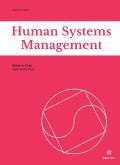Authors: Nasar, Nasreen | Ray, Sumati
Article Type:
Research Article
Abstract:
BACKGROUND: Nowadays organizations have made their human resource management process more strategic and serve as a strategic tool for achieving competitive advantage for the organization with the development of electronic-Human Resource Management (e-HRM) Systems. To measure e-HRM system acceptance for performing various HR functions of an organization, especially the HR department, a perception model for acceptance of e-HRM systems in IT and Non-IT organizations has been developed in this research paper. OBJECTIVE: The objective of the study is to derive an acceptance model that can predict the acceptability and the factors affecting the acceptance of e-HRM systems in
…IT and Non-IT organizations. For this purpose, an electronic-survey-based questionnaire with a set of questions with categorical response options has been developed and the responses collected through this questionnaire are eligible to measure the acceptance level with effectiveness and usefulness of the e-HRM systems by IT and Non-IT business organizations. METHODS: Here, the questionnaire has 22 parameters. During data collection, 400 samples are obtained from 20 IT and 20 Non-IT (other services) organizations where ten employees from each organization participated in the survey. For the Data analysis for the acceptance model and also for testing of the hypothesis, several statistical-based data analysis techniques such as Data Reliability, Cross Tabulation, Normality test, Correlation ∖& Regression-based analysis, Factor Analysis, along with Pearson Chi-Square, Mann-Whitney U, Wilcoxon W for hypothetical testings are done. Apart from these criteria, using the data analysis techniques, a well-known technology acceptance model for the e-HRM system has also been employed to test with variables of the proposed questionnaire for the acceptance of e-HRM systems. RESULTS: All the statistical tests and testing of hypotheses are done in a sequential manner for comparison purposes of factors that affect e-HRM systems in IT and Non-IT organizations. The results are reported in detail with explanations and justifications. CONCLUSION: The results of the data analyses can be concluded with finding and discussing that the acceptability of e-HRM systems by the end users in IT firms is much higher than in other service organizations because of the significant difference in presence of external factors, perceived usefulness, perceived ease of use, user attitude, and behavior between the IT and Non-IT groups of organizations.
Show more
Keywords: e-HRM, IT, Non-IT, perception model, data analysis, acceptance criteria, questionnaire
DOI: 10.3233/HSM-220177
Citation: Human Systems Management,
vol. 43, no. 1, pp. 99-123, 2024
Price: EUR 27.50





